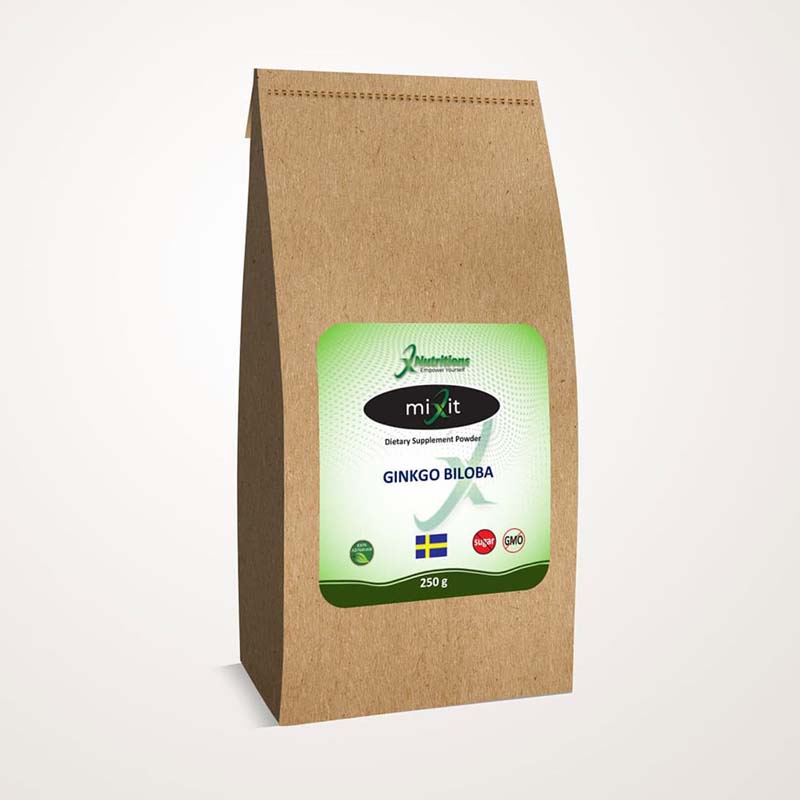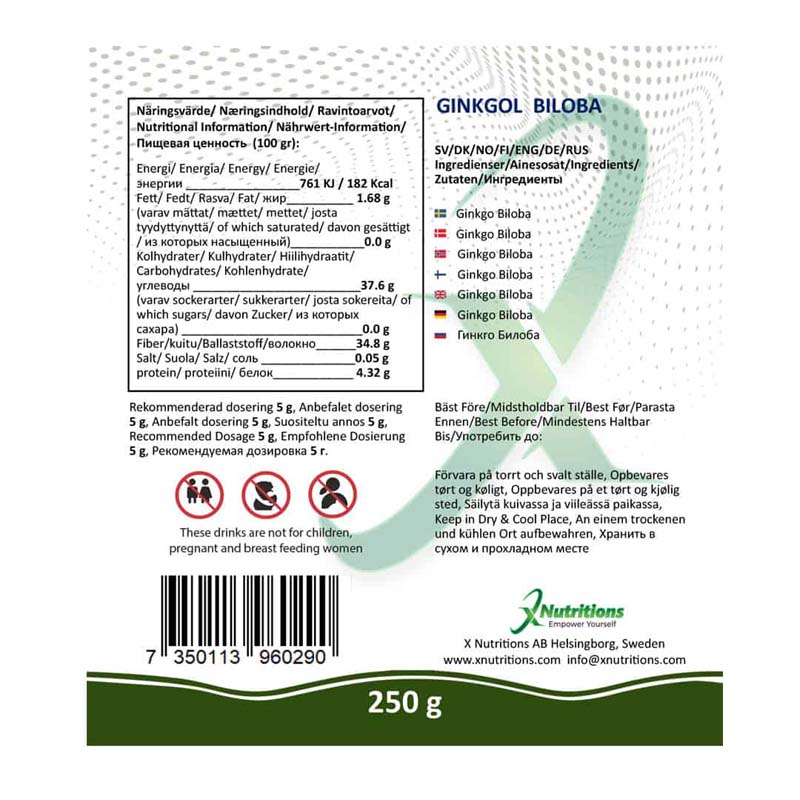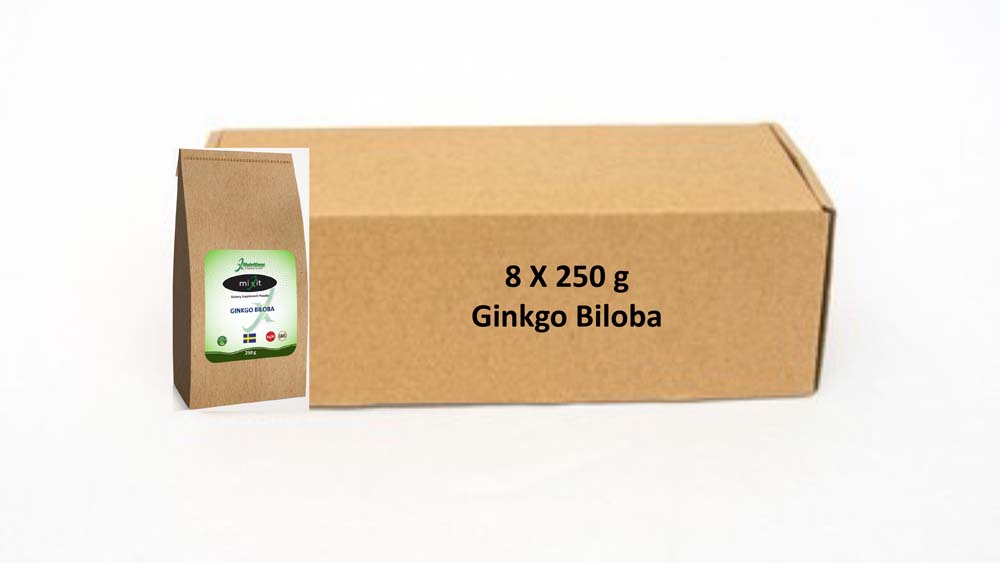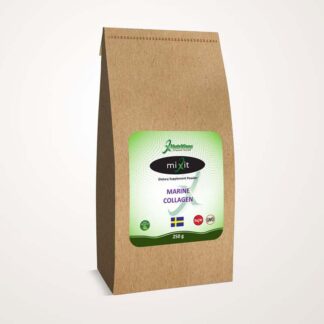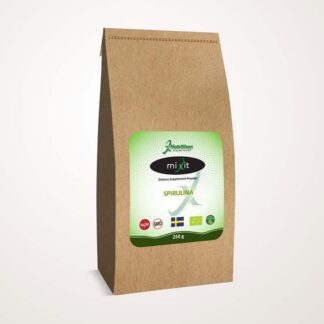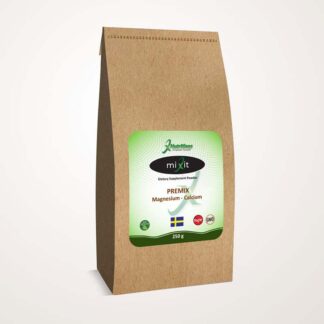Ginkgo Biloba Powder
Login to see pricesGinkgo Biloba Leaf Powder
Improves blood flow to the brain and may help ease a number of circulation problems, including vascular dementia and leg pain.
- Brain herb
- Higher libido
- Antioxidant
- Antidepressant
- Mood balance
What is it?
Ginkgo Biloba is one of the oldest living trees, and the extract from its leaves is rich in nutrients that can help treat a number of ailments. Ginkgo leaves contain two types of chemicals, flavonoids and terpenoids, which are considered to be potent antioxidants. Antioxidants are believed to play a role in preventing the development of serious diseases such as cancer, heart disease, stroke, Alzheimer’s disease, Rheumatoid arthritis, and cataracts. It is no wonder that Ginkgo Biloba is one of the best selling and top prescribed herbal medications in the world.
How to use?
Take 1 teaspoon 2 – 3 times a day. Consult your doctor beforehand if you use any other medication, especially blood-thinning medicines.
Ginkgo biloba can be added to yogurts, drinks and smoothies, or mixed in with any other superfoods for stronger effects.
Ingredients
Premium Ginkgo Biloba Leaf Powder
Origin: China
Health benefits
– Depression and mood swings.
Patients diagnosed with mild stage of depression may derive greater benefits from extract of Ginkgo biloba. Older patients showed greater improvement when treated with the extract of Ginkgo biloba, and renounce the use of additional antidepressants.
– Antioxidant.
Ginkgo Biloba provides a powerful body antioxidant needed to rid the cells from the harmful effects of free radicals and help repair cells. This is important for preventing heart disease, stroke, cancer and many other serious conditions.
– When noise or ringing in the ears.
It has been shown that Ginkgo Biloba helps in the treatment of noise or ringing in the ears. It is still unclear how this herb promotes healthy ears, but it is believed that improves the flow of oxygen to them.
– Higher libido
Ginkgo’s hallmark effect is increased circulation, which is important in maintaining our energy level and one of the factors in stopping early hair loss. Increasing genital blood flow heightens responsiveness, making for higher libido in both men and women. Good circulation means getting the full benefit from the foods we eat and the vitamins and herbal supplements we take.
– Helps in the battle with Raynaud’s disease associated with reduced blood flow to the extremities.
Ginkgo Biloba works by increasing blood flow to the arms and legs, and relieves spasms in blood vessels.
– Eases Alzheimer’s disease.
Still no cure for Alzheimer’s disease and doctors are not sure what causes it. Many doctors, however, strongly believe that Ginkgo Biloba contributes positively, increasing blood flow to the brain, neural transmitters and improves the slow degeneration of brain cells.
– Relieves Parkinson’s disease.
Parkinsonat associated with uncontrollable shaking, loss of coordination and balance, and it is believed that regular use of Ginkgo biloba alleviates these symptoms. The herb increases blood flow to the brain and provides a higher concentration of neurotransmitters that are present in the brain at any time.
– Prevents and treats stroke.
Ginkgo Biloba helps to prevent stroke by minimizing the formation of blood clots in the arteries and improve blood flow to major organs including the brain. In patients with a stroke, Ginkgo Biloba can help to restore damaged brain cells.
– With multiple sclerosis.
You still need research, but scientists believe that Ginkgo Biloba will be useful to treat the harmful effects of multiple sclerosis in the future.
Studies have shown that the nutrients in Ginkgo extracts may help treat the following specific ailments:
Dementia
Alzheimers
Retinal problems
Tinnitus
Cardiovascular disease
High blood pressure
Additionally, Ginkgo Biloba can help to improve mood and coordination, as well as increase energy levels, strength, and mental performance. Studies have also found that it can increase sensations in individuals with multiple sclerosis (MS).


